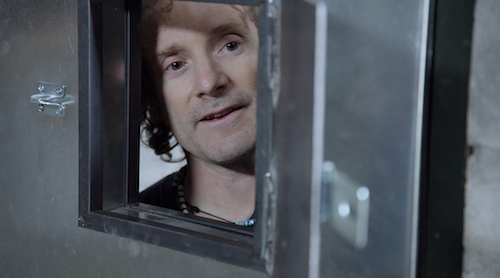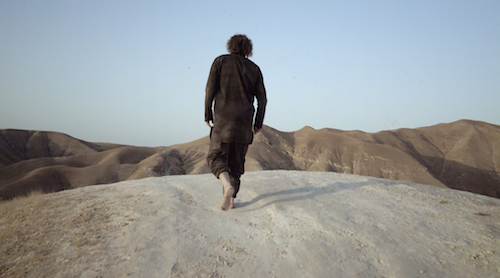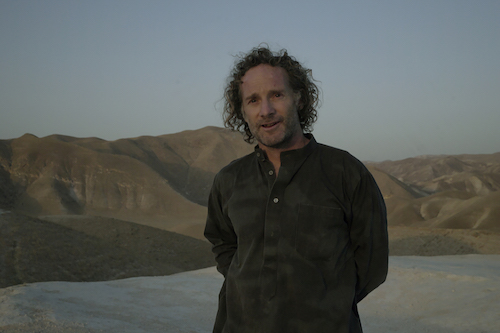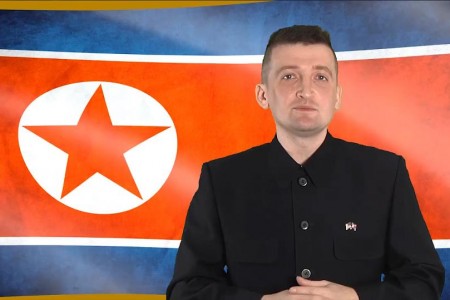AFP Film: A Hostage’s Humanity
The story of Theo Padnos, an American journalist captured in 2012 by the Nusra Front (Syrian branch of Al Qaeda), Theo Who Lived is not quite like other hostage accounts, of which there have (sadly) been many. Yes, David Schisgall’s documentary concerns an idealistic do-gooder who puts himself in danger and it includes the familiar details of captors who veer from friendly to cruel, as well as the grim specifics of interrogation and torture, of terrible deprivations and conditions. Theo Who Lived, however, consists almost entirely of Padnos reliving his ordeal by revisiting various locales of his 22-month captivity, as he narrates his story with good humor, even wit.
A genial, often rather naïve-seeming sort, Padnos was a struggling writer from Vermont who thought he’d kick-start his journalism career by writing a story about Syrian refugees for The New Republic. In the film, he acknowledges being a lifelong risk taker, but also questions why he ever put himself in such a dangerous situation. He walks us through Antakya (Antioch), Turkey—a city where journalists, fighters and other interested parties gathered before crossing the border into Syria and shows us the house he shared with several roommates as well as the house where his kidnappers lived (and may still live). In Syria Padnos shows us the very room where he interviewed young men he thought we members of the Free Syrian Army, until they suddenly began beating him, declaring him their prisoner. Remarkably, he is able to provide the details of this horrific moment with candor and relative composure.
In Vermont, we meet Theo’s mother Nancy, as well as his cousin Viva, who—with other relatives—launched into the long, often frustrating search for an American hostage in the Middle East.
After an escape attempt, Padnos was tortured both physically and mentally, with constant threats of immediate execution. (Because he speaks Arabic, it was assumed he’s with the CIA.) Somehow, he always sees the humanity in his captors, acknowledging that the families of the boys who take part in his beatings had probably been through hell. He also gets what many don’t—that these young guys were having “the time of their lives” in groups like Nusra, with free weapons, camaraderie, and the awesome prize of an American hostage.
At one point he asked for a cellmate and got Matthew Schrier, who turned out to be a less than ideal companion. Though they both planned an escape, only Schrier made it. We see the interviews he subsequently gave on CNN and 60 Minutes, probably also seen by Padnos’s captors, who amped up the torture. We visit the tiny cell in which he was then kept for 200 days. He describes, almost jokingly, how he would sit against different walls to break up the monotony. To stay sane, he began writing a novel on paper and pens supplied by his young captors who were fascinated and entertained by his readings from the work, like a modern-day Arabian Nights. “It soothed the poison out of them,” he notes.
Around this time, James Foley was kidnapped and Nancy befriended his mother, a fellow New Englander, as they shared a terrible burden. Nancy describes how she unsuccessfully tried to bargain with her son’s captors who demanded an exorbitant sum for Theo’s release. (Unlike other countries, the U.S. government refuses to negotiate with terrorists.)
At one point, with Al Qaeda competitors ISIS threatening his captors (another interesting complication), Padnos was moved to another location and gained the favor of the group’s chief. Taking advantage, he tried another escape, only to be brought back to his captors once again. Just when it seemed like the end, Foley was executed on videotape to the horror of the world, and everything changed for Theo.
Though some may be annoyed by Padnos’s blithe idealism and seemingly blind willingness to put himself in danger, one can’t help but be moved by his humanity. (After his release, he continued to advocate for Syria, volunteering to help refugees on the island of Lesbos.) The fact that he still harbors any good will seems miraculous, but his obvious need to connect with other human beings undoubtedly helped keep him alive in the first place. Though we will (and should) never be as reckless, we could all learn something from Theo.
Theo Who Lived opens on Friday at Lincoln Plaza Cinemas.
—Marina Zogbi





